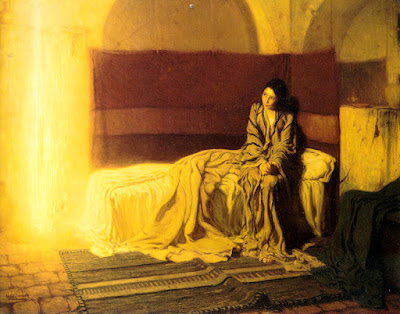Readings: Is 7:10-14; Ps 24; Lk 1:26-38
Don’t you just
love Isaiah? The prophet talks a lot about fulfillment, and usually does so
fearlessly, even when he must challenge worldly powers. King Ahaz for example,
was not a good man. Indeed, he was especially bad, following pagan abominable
practices like human sacrifice, even sacrificing his own son. He did many more
nasty things which I won’t go into here. Judah was being attacked by the
Syrians on one side and the Assyrians on the other, and Isaiah encourages Ahaz
to ask God for a sign. Ahaz rejects the idea, but this displeases God and through
Isaiah God gives Ahaz a sign anyway.
What we get is
a messianic prophecy: a king and heir to David will bring salvation to God’s
people. And He will come to the world uniquely:
“…the virgin shall conceive and bear a son, and shall name him Emmanuel” [Is 7:14]
Emmanuel: "God is with us." Our Savior, then, will come to us as a child. God will take human form, becoming one of us. This Child not only blesses the world with God's miraculous and divine liberation, but through Him, God becomes present among humanity and the promises heard so often before come true:
“I will be their God and they will be my people” [Jer 32:38]
This fulfillment is proclaimed to us by Luke as Mary is invited to be the Mother of the Savior of the world. This Jesus will be both God's Son and hers. I doubt that Isaiah ever dreamed of this: that the Word would be made flesh and live among us as one of us.
And so, you and I, the entire world, are thrust into the greatest event in all human history: the God of Creation becomes one of us. And what does God do? He makes it all depend on the agreement of a teenage, Jewish girl, simply to convince us that “nothing will be impossible for God” [Lk 1:47].
That’s just how
God works: always calling the weakest to greatness. How did Andrew, the future
apostle, put it?
“Can anything good come from Nazareth?” [Jn 1:46]
Nothing much, other than the Savior of the World, our Blessed Mother, and the obedient, God-fearing Joseph who devotes his life to protecting his family, protecting God’s family. Yes, indeed, nothing good comes from Nazareth except the Holy Family, except God Himself. And it’s here in Nazareth, not in Rome, or Athens, or Alexandria, where God chooses to enter our world. He appears in a tiny, forgettable Galilean village, in a backwater of the Roman Empire.
But as the
prophecies remind us, it’s all been long prepared, a part of God’s unerring
plan, so when Gabriel says, “Hail, full of grace, the Lord is with you” [Lk
1:28], we know Mary has been chosen from the beginning of time itself.
“Do not be
afraid” [Lk 1:30], Gabriel says, and Mary sheds her fears. But the
angel’s words echo down through the ages to our own times.
So many today
are filled with fears, fears that try to overcome their faith.
So many have
forgotten their calling as Christians, to give birth to Jesus in their lives
and the lives of others.
Like Mary we
have been called to give an unconditional “Yes” to God’s presence in our lives.
Like Mary, we
too must ponder and reflect to discern what God is asking of us.
Like Mary at
the foot of the Cross, we can be plagued with questions that seem unanswerable.
But like Mary,
we, too, can hear and accept Gabriel’s words, “Nothing will be impossible
for God.”
Wonderful,
hopeful words that bring us peace as we welcome the Prince of Peace.


No comments:
Post a Comment